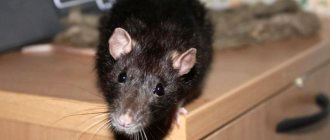Decorative rats can suffer from mange even with proper care - the reasons for this are varied, from nutritional disorders to allergies. Scratching on the skin can also be a sign of a number of diseases. What to do if a rat itches until it bleeds? First you need to examine the animal for other signs and observe its behavior. There are several common causes of scabies that can be quickly identified by additional symptoms.
Parasites
The most common parasites found in decorative rats are fleas. These skin parasites can cause scabies, followed by scratching until it bleeds. Mostly they pass on to rats from other pets. Fleas and traces of their vital activity are easy to detect; a simple examination of the rodent is sufficient; in this case, the cause of scabies is clear.
Flea bites provoke allergic reactions, and subsequently severe itching. The main lesions can be seen on the sides of the rat's body.
Signs
The animal is restless, there is constant scratching with its paws, and the presence of parasites can be easily detected on the body. Appetite is not affected.
Treatment
For an effective result, you need to treat not only the rat with a special preparation, but also its habitat (house, cage). For preventive purposes, treatment of all pets is necessary.
Prevention
Decorative rats should be kept clean, regularly change the bedding, wash the cage, feeder, drinking bowl with disinfectants, and then wash the surfaces with clean water and dry. Before exhibitions and the introduction of new animals, the rat is given preventive treatment against parasites.
To avoid allergies, the filler should not be made of coniferous wood. Rats are often allergic to protein in their diet, artificial colors, flavors, and taste enhancers. To determine this, when scratching, the rat is transferred only to ready-made dry food, adding one product a little at a time and monitoring the body’s reaction.
Rats, like other animals, need to be examined regularly to prevent further development of the disease. To visually inspect rats, experienced breeders use a magnifying glass or strong lens. If scratches and wounds are associated with mechanical damage, the rats must be seated and sharp objects hidden.
Pediculosis (lice)
After fleas, lice are the second fairly common skin parasite. But they are not as easy to detect as fleas. It is almost impossible to determine the cause of itching the first time, because lice are practically invisible. Lice bites cause severe pain, so the rat scratches until wounds appear in just a few days.
Signs
Unbearable itching, traces of bloody scratching on the body of rats. The lesions are localized on the muzzle and withers. Lost appetite.
Treatment
It is necessary to treat your pet with an antiparasitic drug.
Ear mites
Psoroptes cuniculis are ear mites that cause itching and scratching in the ears of their hosts. These parasites spread from rat to rat, so be sure to wash your hands after handling an animal with ear mites.
Signs of ear mites include balding around the ears, crusts around the ears, and the rodent's ears may appear dirty. If your rat tilts its head, flaps its ears, and shakes its head more than usual, this could also be a sign of ear mites.
If you notice these signs in your pet, take him to the vet. They will perform an examination to determine the presence of ear mites and prescribe anti-parasitic medications.
During the treatment period, ensure that the pet's environment is thoroughly cleaned and remove all bedding.
Ectoparasites
Ectoparasites such as demodex, notoedrosis, sarcoptic mange, and lice eater can cause similar symptoms in decorative rats. These are subcutaneous mites, and the main difficulty is that only a doctor can detect their presence by conducting the necessary research - laboratory tests and scraping of the deep layers of the skin. The appearance of claw marks in the ears and head, as well as the occurrence of dandruff and partial alopecia may indicate damage by ectoparasites.
Signs
The rodent is not active, the appetite has disappeared, the rat is itching, and partial alopecia may be observed.
Treatment
You need to understand that treatment for such lesions takes a long time. It is necessary to treat the animal with antiparasitic solutions, for example, Ivermectin. Independent use of this drug is unacceptable, because It is used for animals of large breeds; for a rat, only a veterinarian can calculate the required dose of medicine. If used incorrectly, it can cause intoxication and subsequent death of the pet. After cure, a repeat analysis (scraping) is necessary. Antiparasitic shampoos are used as a preventive measure.
If you purchased drops that are indicated for cats and dogs to treat skin parasites, do not forget about the dosage.
A rat is much smaller and an incorrectly calculated medicine can cause poisoning. Experts advise purchasing products suitable specifically for rats.
Should I go to the vet?
The mobility and small size of the animal complicate diagnosis at home. In addition, the short life expectancy makes it necessary to treat the decorative rat with great responsibility. An erroneous diagnosis and incorrectly selected treatment will shorten the already short existence of the rodent.
Contacting a veterinarian in cases where the rat scratches itself and in case of other ailments is highly recommended. Treatment should be carried out under the supervision of a specialist. After a course of prescribed therapy, you need to be tested again to prevent relapse.
Other diseases
In addition to skin problems, severe itching can be caused by liver and kidney diseases, malfunctions of the gastrointestinal tract, infectious, viral or fungal invasions.
In these cases, in addition to itching, the following symptoms can be noted: discharge from the eyes and nose (reddish), stomach upset, apathy, loss of appetite.
If a rodent scratches its eyes, conjunctivitis may develop.
Worm infestations also cause scabies , but before treatment for helminths you should get tested; most antiparasitic drugs are quite toxic. Only after confirming the diagnosis, the veterinarian will calculate the required dosage, taking into account the weight and characteristics of the rat.
Diseases of the reproductive organs
Surgical pathologies
Females may have inflammatory diseases affecting the uterus (seroso-, hemato-, pyometra). They require the intervention of a surgeon, as they threaten the death of the animal.
In males, typical surgical pathologies of the genital organs include tumors of the testes; in females, cystic formations of the ovaries and their tumors of a malignant nature, which often spread to surrounding organs.
Miscarriage
This can be caused by the early age of the female or, conversely, late pregnancy, some infectious diseases (listeriosis), injuries, or a large number of fetuses.
Spirochetosis
The disease is chronic and caused by spirochetes. It is characterized by swelling in the genital area of animals, mucous-serous discharge mixed with pus. Spirochetes can get into the anus, on the back of the animal, and the epithelium of the eyelids. Ulcers form at the sites of their penetration.
Allergy
Along with skin parasites, allergic reactions are also a fairly common problem.
Itching and scratching in the neck and sides can occur for the following reasons:
- improper diet – predominance of protein-rich foods;
- junk food – rats are omnivorous rodents, sometimes they are given human food (salty, spicy, fried and sweet), which is extremely undesirable;
- low-quality filler containing chemical components;
- the use of unprocessed sawdust, which contains fresh oils and resins, as bedding;
- use of newspapers for bedding; components of printing ink are harmful to rodents;
- household chemicals used to clean the home.
The clinical picture of the allergy is persistent severe itching, as a result of which the pet scratches the skin until wounds form. The main treatment is to identify the source of the allergy and eliminate it.
To do this, you need to review your pet’s diet - eliminate harmful foods; replace the filler with natural one, and use hypoallergenic products to clean your home.
The rat is constantly itching, what should I do?
Decorative rats can suffer from mange even with proper care - the reasons for this are varied, from nutritional disorders to allergies. Scratching on the skin can also be a sign of a number of diseases. What to do if a rat itches until it bleeds? First you need to examine the animal for other signs and observe its behavior. There are several common causes of scabies that can be quickly identified by additional symptoms.
Avitaminosis
A lack of essential vitamins can cause various ailments and discomfort, including:
- Apathy
- Sneezing
- Itchy skin
- Hair loss
- The occurrence of painful ulcers and other skin lesions
Diet is very important for the quality of life of a rodent; the diet should include balanced food, a sufficient amount of grains, herbs, fruits and vegetables.
In addition to minor troubles, amitosis contributes to a decline in immunity, and as a result, metabolism is disrupted and serious diseases occur.
The veterinarian, having identified a lack of vitamins, will prescribe a treatment regimen, which consists of a course of injections and adjusts the diet. If vitamin deficiency is not at a critical stage, pharmacy vitamin complexes will be enough. Often, such vitamins are produced in granules, with special additives, so that the animal consumes vitamins without problems.
Allergic reaction
Allergies are one of the most common causes of itchy skin. If you notice that your rat is scratching its neck and sides, this reaction can occur for several reasons:
- unhealthy diet - poor diet, excess protein foods;
- harmful foods - rats are omnivores, and domestic animals are often treated to forbidden delicacies from the human table (sweet, salty, fatty);
- chemical components of the filler;
- bedding made of unprocessed fresh sawdust with an excess of resins and oils;
- printing ink on newspapers used for bedding;
- detergent compositions, cage cleaning powders.
The allergic reaction often manifests itself in the form of severe, persistent itching, so the rat scratches itself until it bleeds. It is necessary to check all possible causes of symptoms, try to identify and exclude the allergen. Put the animal on a strict diet, change the litter, and clean without household chemicals.
Stress
Sometimes, against the background of nervous shocks, for example, when changing housing or other familiar conditions, the animal experiences stress. This can trigger the development of itching. Along with the itching, anxiety or panic of the animal is noted - the appetite disappears, the rat rushes around the cage or, conversely, does not make contact, huddling in the corner of the cage. In this case, you should not forcefully take the rodent by hand. The best solution is to leave the animal alone, let it settle, and remove the source of stress. Sometimes experts advise adding vitamins and a drug to combat stress (“Anti-stress”) to the food.
Excessive washing
The Rat may groom itself or others excessively. Causes include stress, overcrowding or incompatible social groups.
Excessive washing of the animal will prevent external skin lesions such as scabs and ulcers. Body hair may be broken in just one area or all over the body, but the skin underneath should be intact.
Treatment may include trial separating animals through a mesh partition or reducing overcrowding. If this is not possible, try increasing the available space with additional hanging hammocks or tunnels.
Read also: Why is bird droppings white?
Living conditions and animal hygiene
If all of the above reasons are excluded, and the animal continues to itch, pay attention to the conditions in which your pet is kept. Replace bedding and litter if they do not absorb moisture well. Sometimes it happens that the animal is not clean enough and does not perform the necessary steps to care for its coat.
If your pet is not litter box trained, urine may cause itching and irritation as it gets absorbed into the fur.
In this case, change the filler more often, keep the cage clean and bathe your pet yourself. In pet stores you can buy shampoos specifically for rodents. And rats love water treatments.
Preventive measures
Simple preventive measures will help rid your pet of scabies. To prevent the problem, you must do the following:
- Normalize the rat's diet. If difficulties arise with the selection of a balanced natural diet, it is recommended to switch to specialized food for rats. Ready-made formulations contain all the vitamins, micro- and macroelements necessary for fluffies.
- Ensure timely hygiene measures - regularly clean the cage and wash the pet. Rats love to swim. Therefore, it is not difficult to arrange an impromptu bath for a rodent. All you have to do is fill a cup with some warm water and let the rat swim. To keep the fur in order, it is recommended to use special shampoos for rodents during water procedures - Shustrik, Befar, Veda.
- Regularly inspect the animal's fur for the presence of blood-sucking parasites. In the initial stages, it is much easier to get rid of insects - you just need to treat the problem areas several times with a specialized product.
- Create comfortable living conditions for the animal - do not overload it with attention after moving to a new place, place a same-sex neighbor in its cage, take care of the microclimate in the room where the rodent lives.
The most important preventative measure for scabies in a fluffy is going to a veterinary clinic. Because the question of why a rat itches can only be answered by a qualified veterinarian. The specialist will select the optimal treatment, and the pet will soon feel much better.
Mechanical damage
If the rat does not live alone in the cage, it is possible to receive wounds and abrasions during games or fights. Healing areas of the skin cause itching, and there is also a risk of infection.
If you find wounds on your pet, you need to house it separately and treat the damage with hydrogen peroxide, then apply tetracycline ointment or Levomekol. You should not apply a large layer of ointment so that the rodent does not ingest the medicine. For serious damage, consult a veterinarian.
Other reasons
In fact, there are many other reasons that cause a rat to itch excessively. Among the most common:
- Diseases . Scratching until blood bleeds may indicate the following diseases in rats: kidney failure, gastrointestinal disorder, liver cirrhosis, conjunctivitis. In such cases, you will have to contact a veterinary clinic for treatment.
- Insufficient hygiene . The rodent cage needs to be cleaned regularly - wash the drinkers, feeders and tray 1-2 times a week, change the filler when it gets dirty. Also, once a month it is necessary to do general cleaning - thoroughly clean everything inside with baking soda.
- Ringworm . In rats, fungal disease is extremely rare. Symptoms include the appearance of bald patches, flaking of the skin, and breaking off hairs at the roots. In this case, it is necessary to treat the animal with antifungal drugs.
- Hormonal disbalance . It is observed in males during puberty and in females during pregnancy. Disruption of the endocrine system often leads to increased secretion of subcutaneous sebum, which causes the skin to quickly become dirty and itchy. The solution to the problem is quite simple - during the period of hormonal surges, it is necessary to bathe the fluffies more often.
Regardless of the cause of the skin itching, the problem needs to be solved as soon as possible. After all, over time, the number of wounds will increase, and the pet’s condition will worsen.
What does a sick rodent look like?
A breeder of rats and mice should be aware of a number of signs that may indicate ill health in a pet.
Suspicious symptoms:
- change in behavior (apathy, aggression);
- discharge from the eyes, cloudy cornea, sticky eyelids;
- dull and unkempt fur;
- nasal discharge, mucus, crusts;
- unusual posture, tension.
Diseases of the cardiovascular system are characterized by a lack of air, the rodent falls on its side. Urine will “tell” about kidney diseases; it is cloudy, with impurities, a pungent odor, and discolored. Constant itching, bald spots, and hair loss indicate skin parasites.
All decorative rodents have problems with teeth. In nature, they constantly chew on objects, grinding down their teeth. Pets at home do not have the opportunity to move freely and choose. If the owner does not take care, there is a risk of excessive growth of the incisors, damage to the soft tissues of the skull and bones.
Actions in case of itching
It is advisable to visit a doctor; the owner cannot always independently determine the cause of unpleasant sensations. Prescribing and using medications is undesirable without consulting a specialist.
By taking care of your pet's health, he will delight you for a long time and become a source of positive emotions.
What I am a master at is talking incessantly about hamsters. I have three hamsters at home, and my husband has a pet rat. That’s how we live, the six of us eat, the six of us sleep :)
Post Views: 13,657
Dry skin
Your rat's skin may become dry due to being in a room with low humidity, being too dusty, not eating well, or being bathed too often with the wrong foods.
Dry skin can cause itching, which can make your rat irritated and uncomfortable. Look at your pet's environment and the products you use and make some changes if necessary.
Signs to look out for if your pet has dry skin include dandruff and severe itching.











